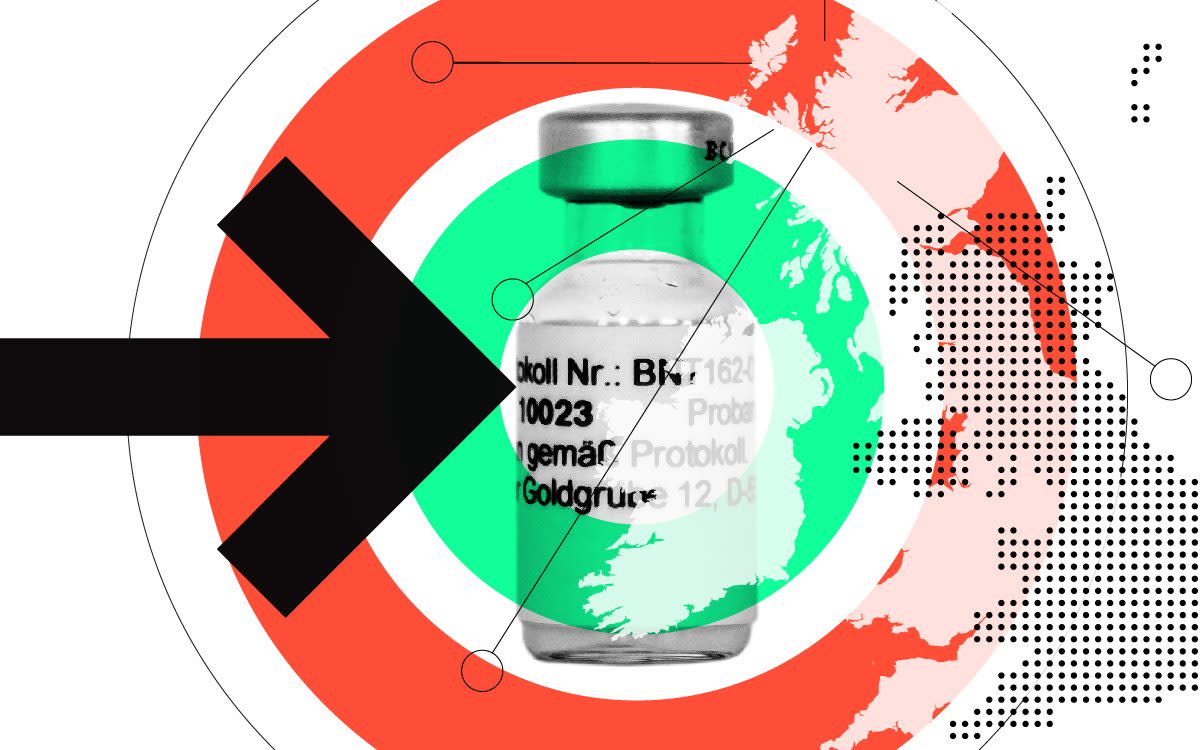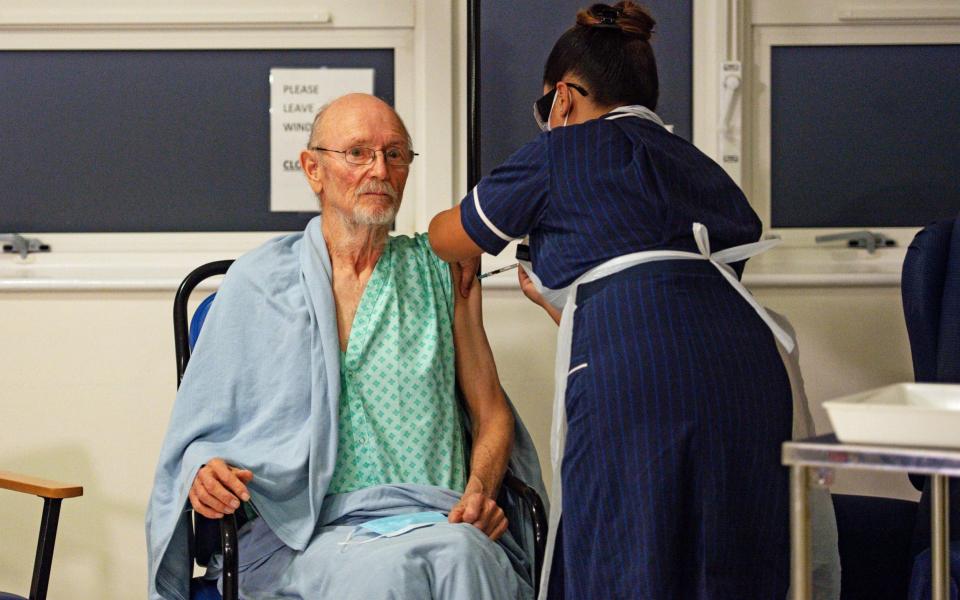The hospitals that will have the Covid-19 vaccine, and how it will be rolled out


The coronavirus vaccine roll-out began on Tuesday December 8, with 50 hospital hubs starting to immunise the most vulnerable. It marks the beginning of the largest immunisation programme in British history.
The first vaccine was administered to a 90-year-old grandmother, who received the jab from University Hospital Coventry and Warwickshire at 6.31am.
Margaret Keenan, who turns 91 next week, said: "I feel so privileged to be the first person vaccinated against Covid-19, it's the best early birthday present I could wish for because it means I can finally look forward to spending time with my family and friends in the New Year after being on my own for most of the year."
William Shakespeare, 81, was the second person to be vaccinated in Coventry and Michael Tibbs, 99, was the first person in the South West to receive the vaccine at Queen Alexandra Hospital in Portsmouth.

Here is everything you need to know about the first stage:
Which 53 NHS trusts will receive the vaccine first?
Blackpool Teaching Hospitals
Brighton and Sussex University Hospitals
Cambridge University Hospitals
Chesterfield Royal Hospital
Countess of Chester Hospital
Croydon University Hospital
Dartford and Gravesham Hospitals
Dorset County Hospitals
East and North Hertfordshire Hospitals
East Kent Hospitals
East Suffolk and North Essex Hospitals
Frimley Health NHS Foundation Trust
Gloucestershire Hospitals
Great Western Hospitals
Guys & St Thomas NHS Trust
James Paget University Hospitals
Kings College Hospital
Princess Royal University Hospital, Kings
Lancashire Teaching Hospital
Leeds Teaching Hospital
Leicester Partnership NHS Trust
Liverpool University Hospitals
Medway NHS Foundation Trust
Mid and South Essex Hospitals
Milton Keynes University Hospital
Norfolk and Norwich University Hospital
Northampton General Hospital
North Bristol NHS Foundation Trust
North West Anglia Foundation Trust
Nottingham University Hospitals
Oxford Health NHS Foundation Trust
Portsmouth Hospital University
Royal Cornwall Hospitals
Royal Free London NHS Foundation Trust
Salford Royal NHS Foundation Trust
Sheffield Teaching Hospitals
Sherwood Forest Hospitals
Shrewsbury and Telford NHS Trust
Stockport NHS Foundation Trust
St George's University Hospitals
The Newcastle Upon Tyne Hospitals
University College Hospitals
University Hospitals Birmingham
University Hospitals Coventry and Warwickshire
University Hospitals Derby Burton
University Hospitals of North Midlands
University Hospitals Plymouth
United Lincolnshire Hospitals
Walsall Healthcare
West Hertfordshire Hospitals
Wirral University Teaching Hospital
Worcestershire Acute Hospitals
Yeovil District Hospital
Particle - illustrator-embed: Where the vaccines will be distributed to
Vaccinations also began on December 8 across Wales, Scotland, and Northern Ireland. Scotland's first Covid-19 vaccinations were under way at the Western General Hospital in Edinburgh. The Western General is one of 23 sites around Scotland which will act as vaccination centres for the priority groups.
The first person to receive the vaccine in Northern Ireland was a 28-year-old nurse from Dundrum in Co Down.
Who will get the jabs first?
Those aged over 80, care home workers, and NHS front-line staff will be targeted first, starting on what the Health Secretary dubbed "V-Day".
Anyone with a history of 'significant' allergic reactions will not receive the jab at his time, after two NHS staff members had an allergic reaction to the vaccine on Tuesday.
The pair are recovering well and the precautionary warning issued to NHS Trusts by the Medicines and Healthcare products Regulatory Agency is common for new vaccines, according to Professor Stephen Powis, national medical director for the NHS in England.
After care homes, the Joint Committee on Vaccination and Immunisation (JCVI) has recommended the population be vaccinated in five-year groups starting with the over-75s.
The JCVI has also stated that key workers will be prioritised in the second phase of the vaccine roll out. Therefore, transport workers, first responders and teachers will be among the first to receive the jab after the most vulnerable.
Sir Simon said the bulk of the vaccination programme will take place from January to April next year.
Initially, the Government was hoping to vaccinate care home residents and staff, as well as the over-80s.
But when the Pfizer jab won the race to be the first approved vaccine, the emphasis shifted to NHS workers as it was believed it would be too hard to distribute the jab, which needs to be kept at around -103F (-75C), to care homes.
However, supply issues have forced another rethink and care home residents and staff will now be targeted first, with NHS Providers working with the Medicines and Healthcare products Regulatory Agency (MHRA) to find a safe way to deliver doses.
The Joint Committee on Vaccination and Immunisation (JCVI) has recommended that the vaccine should be prioritised for the elderly and health workers.
Explaining the priorities for who will get the vaccine, chairman of the JCVI Professor Wei Shen Lim said: "Vaccines are offered to protect people who are most at risk from dying of Covid-19, as well as to protect health and social care services, because by doing so we also protect lives."
The NHS has promised that Britain will receive as many as four million doses of the Pfizer vaccine before 2020 ends. This comes after concerns that much of the public would miss out during the first vaccination wave because of limited supplies.
The next vaccine doses will arrive next week, the Health Secretary, Matt Hancock has said.
"The next scheduled arrival will be next week and the numbers depend on how quickly Pfizer can manufacture it,"
"It is being manufactured in Belgium and obviously right across the UK the job is to be able to get the vaccinations done as quickly as the manufacturer can create it, so we've been all working together really closely, the UK Government, which has been buying the vaccine and getting it delivered into the country, and then the NHS in the four nations of the UK."
I live or work in a care home, what happens now?
Residents and staff do not need to do anything at present but should wait to be contacted by NHS England.
Mr Hancock said he hoped care home residents would start being vaccinated before Christmas.
"We hope to be vaccinating in care homes before Christmas ... but we can only do that as fast as is safe to go," he said.
Until the MHRA approves distribution to care homes, the NHS will be trying to vaccinate as many residents as possible when they visit hospitals for outpatient appointments.
The NHS said it would not be laying on buses to bring care home residents to hospital or expecting frail elderly people to visit hospitals under their own steam. Hospitals are also working with care home providers to book their staff into vaccination clinics which will also prevent spread in homes.
I am 80 or over, what happens now?
Patients aged 80 and above who are already in hospital, and those who are being discharged home after a hospital stay, will be among the first to receive the jab.
Hospitals have also started inviting the over-80s in for a jab, and people at the top of the list do not need to contact anyone in order to be vaccinated – the process will happen automatically.
People have been asked not to turn up at hospitals expecting to be vaccinated after the first patients were given jabs.
A Newcastle Hospitals NHS Trust spokeswoman said a woman in her 90s had turned up at a hospital, having watched the news.
She said people will be contacted when it is their turn to be vaccinated.
I am an NHS worker, what happens now?
Many NHS workers already had appointments for the vaccination before the change of strategy.
NHS Providers said that those appointments would now be reviewed and only those most at risk would still be vaccinated.
However, if there is any leftover vaccine that needs using up following vaccination of care home residents, staff and the over-80s, NHS workers will be next in line.
Can I get the jab from my GP?
GPs and other primary care staff are also being put on standby to start delivering the jab. A small number of GP-led primary care networks will begin vaccinating people from December 14, with more practices joining in on a phased basis during December and in the coming months.
GPs have been told they can scale back other work as the vaccination programme takes precedence and will be paid £12.58 for each vaccine dose administered. Medical and nursing students, retired medics, pharmacists and vets are being drafted in to help manage the huge enterprise.
Pfizer has confirmed that people in the UK will not be able to bypass the NHS roll-out and buy the vaccine privately.
Mass vaccination centres which can treat large numbers of patients will be set up in sporting venues and conference centres when large supplies of the vaccine become available.
What does the vaccine involve?
The vaccine is typically delivered by a simple injection in the shoulder. People will be required to wait for a short time after their jabs to check there are no immediate side-effects.
Everyone vaccinated will be called back in for a booster jab 21 days later.
Most people vaccinated in trials have only experienced mild side-effects, such as pain at the injection site, muscle aches and high temperature, which vanish after a day or two.
Does being vaccinated exempt me from restrictions?
At the moment, no. The Government is considering "vaccination passports", and everyone who has been immunised will receive a card which Public Health England (PHE) says should be kept in a purse or wallet.
However PHE, said the cards are just a record of vaccination and to help people keep appointments and have no other purpose.
What if I don't want vaccination?
The vaccine is not compulsory – nobody will be forced to have it. Hospital staff and GPs will be on hand to talk over concerns.
Boris Johnson said people should not be afraid of getting vaccinated, and that people objecting to having the jab are "totally wrong".
Read more: The Covid vaccine hurdles Britain still needs to overcome

